Who’s got the power?
Unfortunately, UCLA’s got the power.
UCLA updated its Time, Place and Manner (TPM) policies last September, expanding the limitations on when, where and how students and faculty can publicly demonstrate on university property.
Nonetheless, continuously revising such policies has the potential to discourage Bruins from publicly demonstrating, compromising the campus protests’ relevance and inciting violence on campus.
The TPM policies confine public expression activities, such as protesting, leafleting and picketing, to trivial areas on campus. UCLA also restricts the times of day and volume at which students are allowed to publicly demonstrate.
Administrative Vice Chancellor Michael Beck said in a written statement to the Daily Bruin that the UCLA TPM working group, which had been reviewing public feedback to the policies, was considering expanding the designated areas of public expression.
Beck stated that the revised policies would be released in March, but that did not happen. A UCLA spokesperson told The Bruin that the TPM working group “continues to refine” the alterations to the policies.
University campuses used to be places of refuge where students could exercise wider ranges of freedom of speech, said Kevin Anderson, a sociology professor at the University of California, Santa Barbara.
“This is just appallingly restrictive,” Anderson said.
Through the use of TPM policies, UCLA infringes on Bruins’ right to free speech while actively discouraging the manifestation of dissenting opinions and demands.
The American Federation of State, County and Municipal Employees (AFSCME) Local 3299 is a union that represents service, patient care and skilled crafts workers. In February, they filed unfair labor charges against UCLA for allegedly intimidating workers.
The union accused UCLA of threatening to pursue disciplinary action – because of alleged violations of TPM policies – against AFSCME members to prevent workers from striking.
A UCLA spokesperson, however, said in an emailed statement that UCLA respects workers’ rights to picket and seeks to ensure these activities occur according to relevant laws and regulations.
“The suggestion that Time, Place, and Manner (TPM) policies are intended to intimidate employees or suppress their right to strike is both inaccurate and misleading,” the UCLA spokesperson said in an emailed statement.
The series of TPM policies distinguishes between public expression activities, which do not require a permit, and organized events, where organizations must request a permit ten days in advance. These permits are additionally subject to denial.
The TPM policies, however, do not provide details on how to categorize these forms of public expression. For example, UCLA considers “speech-making” a public expression activity but classifies a “speaker presentation” as an organized event.
Additionally, UCLA does not provide any further definitions for “speech-making” or “speaker presentation,” which makes it harder to determine what constitutes one or the other.
The policies also defeat a protest’s primary purpose: promoting change through disruption.
Social movement leaders aim to cause the most disruption to bring attention to their cause by employing demonstration tactics that authorities are not used to regulating, said Omar Lizardo, a UCLA sociology professor.
Having rules designed to prevent disturbances to university activities ensures that the administration has no incentive to comply with protest demands.
Some argue that UCLA needs TPM policies to ensure campus safety.
Violent protests, however, are the exception in UCLA’s long history of activism.
Students protesting a UC Regents meeting in May 1969 broke some of the UCLA Faculty Center’s windows, forcing police to intervene.
Protestors opposing the United States’ involvement in the Cambodian Civil War in May 1970 broke windows, set fire to Ackerman Union and attacked the campus’ ROTC headquarters.
A 1993 peaceful rally against then-Chancellor Charles E. Young’s decision not to expand the Chicana/o studies program to an academic department turned violent when protesters occupied the Faculty Center, breaking windows and causing damage worth $27,000.
After 1993, however, no violent protests affected UCLA’s campus for the next 21 years.
During the April 30, 2024, and May 1, 2024, attack on the Palestine solidarity encampment, counter-protesters, not student activists, initiated violence.
The larger restrictions imposed by TPM policies may induce a level of policing that is counterproductive.
For example, UCPD used riot gear and less-than-lethal weapons on April 30, 2025, to disperse a movie screening organized by Students for Justice in Palestine at UCLA, a suspended student organization. The gathering moved from Wilson Plaza along Bruin Walk in response to requests from a UCLA representative and UCPD.
After the protesters got to De Neve Plaza, around 30 officers ran into the crowd, with three driving motorcycles.
UCPD detained two students and confiscated the screening equipment. UCLA said the equipment seizure was “in accordance” with TPM policies.
Christopher Vazquez, a first-year physiological science student, watched the police sweep of the April 30, 2025, protest outside one of the De Neve Plaza buildings.
The students were not disrupting anyone and simply wanted to sit and project the movie, Vasquez said. The violence began only when the police got involved.
“It was just terrible and disgusting to watch,” Vasquez said.
UCLA did not confirm or deny this account.
Imposing TPM policies causes tensions that may escalate initially peaceful demonstrations and result in violence on campus.
Bruins must urge UCLA administrators to abolish such restrictive policies.
After all, let’s make it so that we’ve got the power.
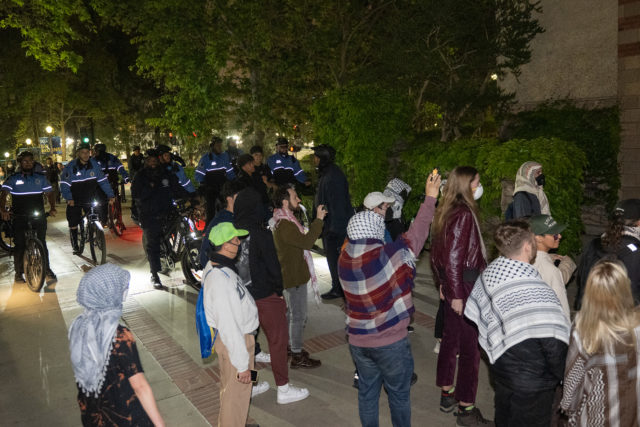

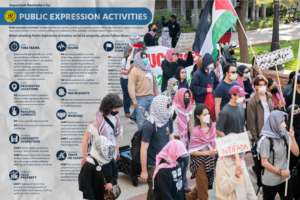
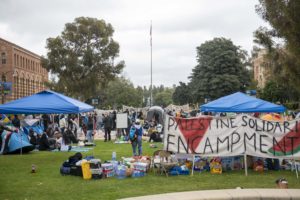
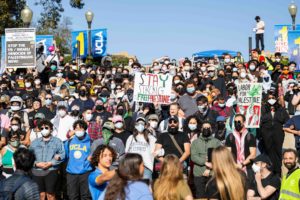
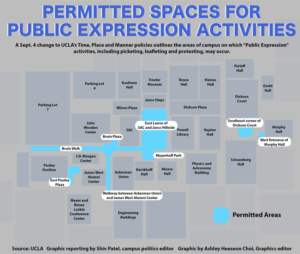
Comments are closed.